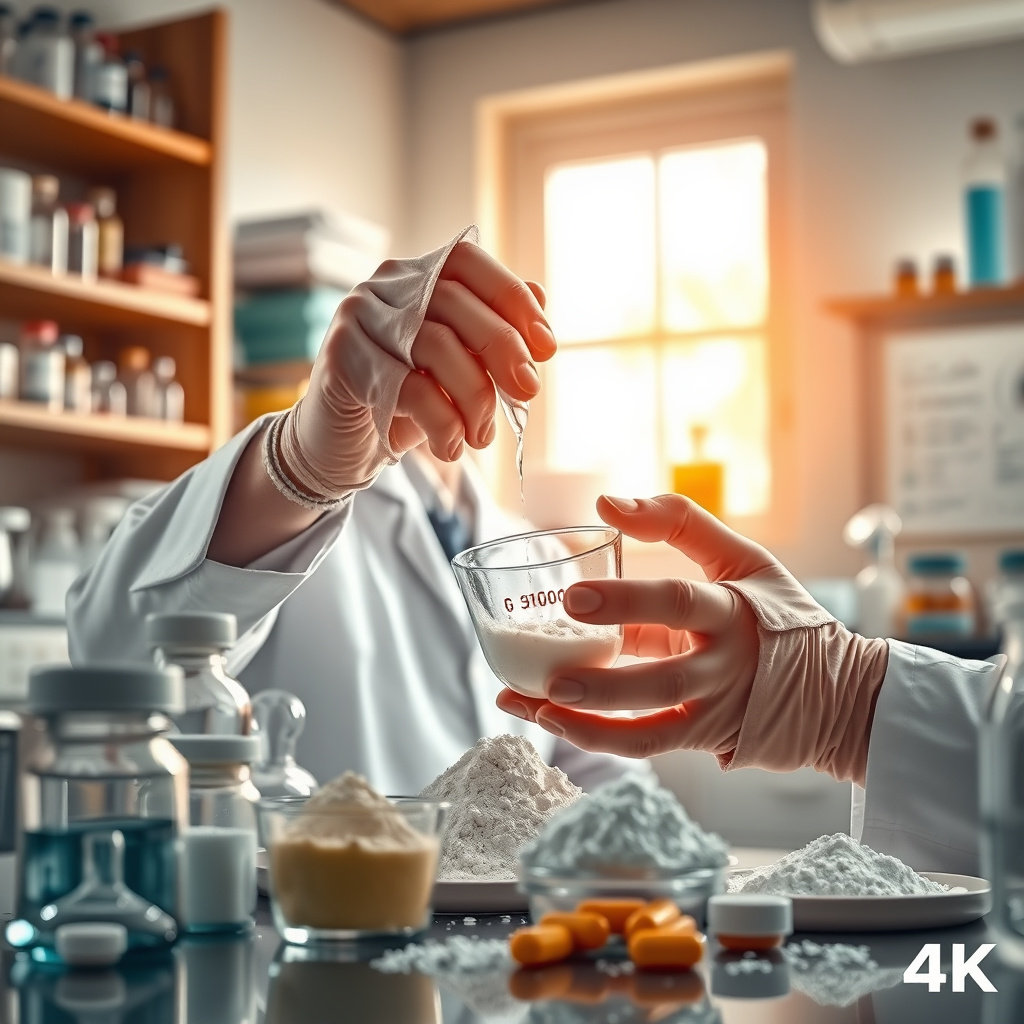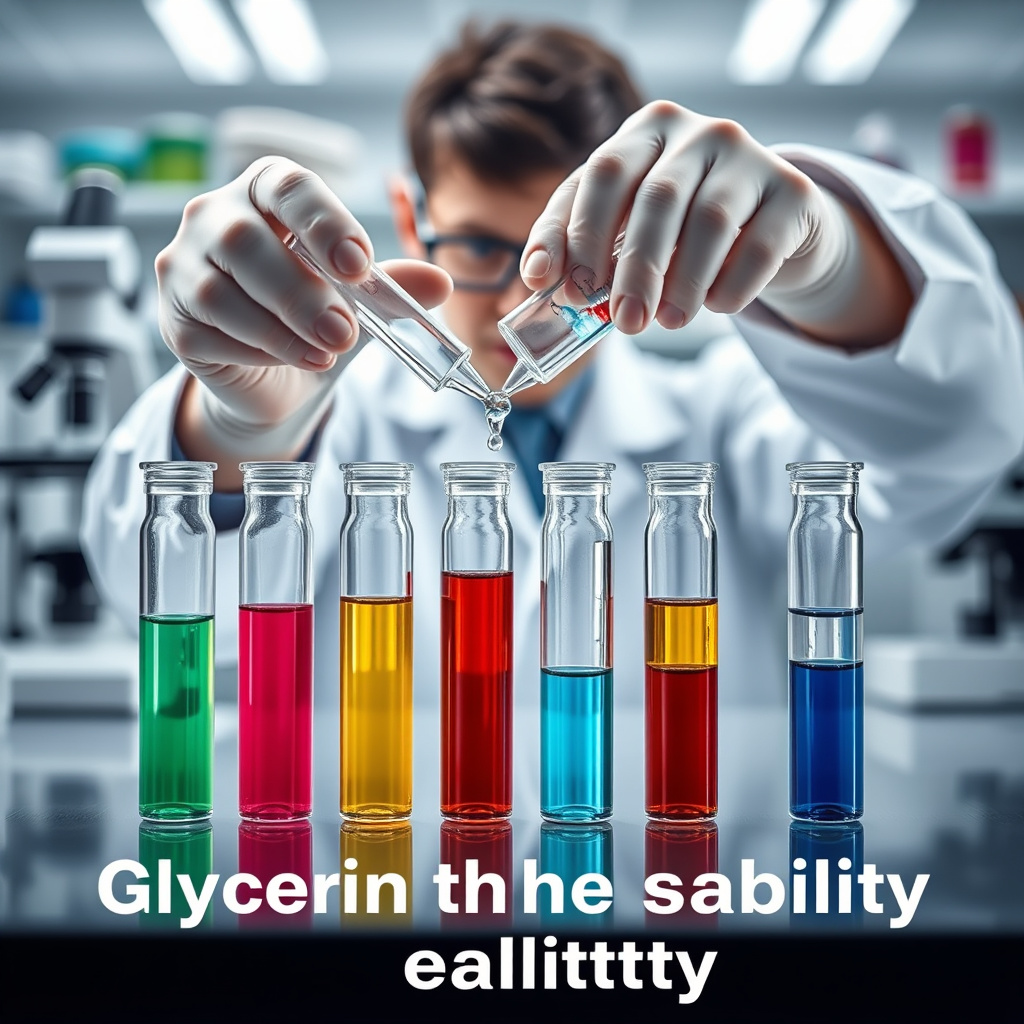How glycerin acts as an excipient in pharmaceutical formulations involves its ability to enhance stability, solubility, and bioavailability of active ingredients.
Have you ever wondered how glycerin plays a crucial role in pharmaceutical formulations?
In this post, we will explore how glycerin acts as an excipient in pharmaceutical formulations, enhancing the effectiveness and stability of medications.
You’ll discover the various functions glycerin serves, from improving solubility to ensuring the proper delivery of active ingredients. Let’s dive into the fascinating world of glycerin and its benefits in the pharmaceutical industry.
The Versatility of Glycerin in Pharmaceutical Applications
In the realm of pharmaceuticals, glycerin proves to be an invaluable ingredient due to its unique properties and versatility. As a humectant, it attracts moisture, making it an essential component in various formulations aimed at enhancing drug stability and bioavailability. This multifunctional compound plays a pivotal role in both liquid and solid dosage forms, contributing to the overall efficacy of medications.
How Glycerin Enhances Formulations
When we delve into how glycerin acts as an excipient in pharmaceutical formulations, we can see its effects on texture, stability, and absorption. For instance, in oral medications, glycerin helps in the dissolution of active ingredients, ensuring they are readily available for absorption in the gastrointestinal tract. This property is especially important for patients who may have difficulty swallowing pills, as glycerin can be found in syrups and elixirs, making them more palatable.
- Moisture Retention: Glycerin’s ability to retain moisture makes it ideal for topical formulations, ensuring that creams and ointments maintain their consistency and effectiveness.
- Solvent Properties: Its solvent properties allow for a better mixing of ingredients, which is crucial in ensuring uniformity in dosages.
- Stability Improvement: Glycerin helps in stabilizing sensitive compounds, prolonging the shelf life of pharmaceutical products.
Glycerin in Different Pharmaceutical Forms
Whether in liquid, gel, or solid form, the presence of glycerin can significantly enhance the performance of pharmaceutical products. In ointments and gels, it provides a soothing effect, making it ideal for treating skin conditions. Moreover, in formulations aimed at children, its sweet taste can improve compliance, encouraging proper medication intake.
The versatility extends to its function as a lubricant in tablet formulations, where it ensures smooth processing and improves the overall quality of the final product. This multifaceted role highlights why many pharmaceutical companies seek reliable glycerin suppliers to ensure consistent quality and performance in their products.
Current Trends in Glycerin Usage
Looking at the current landscape, the demand for glycerin in pharmaceuticals continues to grow. As more companies explore its benefits, the glycerin market trends indicate a shift towards using higher purity grades, such as those offered by pure glycerin suppliers. The emphasis on quality reflects the increasing focus on safety and efficacy in drug development.
At present, manufacturers are also exploring the glycerin production process to enhance sustainability, recognizing the importance of environmentally friendly practices in the industry. This not only meets consumer demands but also aligns with global initiatives towards greener solutions.
In summary, the versatility of glycerin in pharmaceutical applications cannot be overstated. Its role as an excipient supports the development of effective, stable, and patient-friendly formulations, making it a critical component in the pharmaceutical landscape.
Understanding Excipients: Why Glycerin Matters
The Role of Glycerin in Pharmaceuticals
Glycerin, often referred to as glycerol, plays a crucial role in the world of pharmaceuticals. This compound is not just a simple ingredient; it is a versatile excipient that enhances the effectiveness of various formulations. In the context of medicinal products, understanding how glycerin functions can illuminate its importance in creating effective and safe therapies.
One of the primary functions of glycerin is its ability to act as a solvent. Many active pharmaceutical ingredients (APIs) require a suitable environment to dissolve and disperse effectively within a formulation. Glycerin’s unique chemical properties make it an excellent choice for this purpose, allowing for better absorption and bioavailability of the medication.
Benefits of Glycerin as an Excipients
The advantages of using glycerin go beyond its role as a solvent. Here are some key benefits that highlight its significance:
- Moisturizing Properties: Glycerin is a humectant, meaning it attracts moisture from the environment. This property is particularly beneficial in formulations aimed at treating dry skin or mucous membranes, enhancing patient comfort.
- Stability: Glycerin helps stabilize formulations, preventing the degradation of sensitive components and extending the shelf life of medications.
- Taste Masking: In liquid formulations, glycerin can mask unpleasant flavors, making medications more palatable, especially for children.
- Compatibility: Glycerin is compatible with a wide range of substances, ensuring that it can be incorporated into various formulations without adverse reactions.
Glycerin in the Production Process
The glycerin production process involves the hydrolysis of fats and oils, resulting in a pure and safe product. Glycerin can be derived from both animal and vegetable sources, with many pure glycerin suppliers focusing on vegetable-derived options due to their appeal to health-conscious consumers. This versatility in sourcing ensures that glycerin remains widely available, making it a staple in the pharmaceutical industry.
For those looking to incorporate glycerin into their products, sourcing from a reputable glycerin manufacturer or glycerin supplier is essential. The quality of glycerin directly impacts the efficacy of the final product, whether it’s in pharmaceuticals, cosmetics, or even food applications.
Current Trends in the Glycerin Market
Currently, the glycerin market trends indicate a growing demand for high-quality glycerin across various sectors. As awareness about the benefits of natural ingredients increases, more manufacturers are incorporating glycerin into their formulations. This shift is particularly noticeable in the cosmetic industry, where glycerin for cosmetics is highly sought after for its moisturizing properties.
With the rise in demand, those interested in acquiring large quantities can consider options such as bulk glycerin supply to ensure they have a steady flow of this valuable excipient. Understanding these trends can help businesses make informed decisions about their supply chains and product formulations.
In the present landscape, glycerin’s multifaceted role as an excipient in pharmaceuticals underscores its importance not just as an ingredient, but as a vital component that enhances formulation efficacy and patient experience.
The Science Behind Glycerin: Mechanisms of Action in Medications
Understanding Glycerin’s Role in Formulations
Glycerin, a versatile compound, plays an essential role in the pharmaceutical industry, particularly as a Glicerina Farmacêutica. Its unique chemical properties make it an invaluable excipient in various medication formulations. When we delve into the science behind glycerin, we uncover how it works synergistically with active ingredients to enhance their effectiveness and stability.
Glycerin’s ability to attract water makes it an excellent humectant. This property helps maintain moisture in formulations, ensuring that medications remain effective over time. By retaining water, glycerin not only keeps the product stable but also enhances the absorption of active ingredients in the body. This is particularly important for oral medication, where bioavailability can significantly impact therapeutic outcomes.
Mechanisms of Action in Medications
The mechanisms through which glycerin operates in medications are fascinating. When used as a solvent, glycerin dissolves a wide range of substances, making it easier to create homogenous mixtures. This characteristic is crucial for ensuring that every dose delivers the correct amount of medication. Additionally, glycerin can modify the viscosity of a formulation, allowing for better control over how it flows and spreads on mucous membranes, which is particularly relevant in topical applications.
Moreover, glycerin exhibits mild antibacterial properties, which can contribute to the preservation of formulations and enhance their shelf life. This quality is especially beneficial in products that require long-term stability without the addition of synthetic preservatives, aligning with the increasing demand for cleaner and more natural formulations in the pharmaceutical market.
The Future of Glycerin in Pharmaceuticals
In the current landscape of pharmaceuticals, the demand for high-quality excipients like glycerin is on the rise. As more pharmaceutical companies seek to develop effective and safe medications, the role of glycerin will likely expand. The trend towards personalized medicine and tailored formulations can benefit greatly from glycerin’s unique properties.
Manufacturers and suppliers are becoming more aware of the importance of sourcing high-quality glycerin. Whether they are looking to buy glycerin wholesale or partner with reputable pure glycerin suppliers, the focus is on ensuring that the glycerin used is top-notch and meets regulatory standards. This commitment to quality is vital in maintaining the efficacy and safety of pharmaceutical products.
In summary, glycerin is more than just a simple ingredient; it is a cornerstone of modern pharmaceutical formulations. Its multifaceted roles and mechanisms of action are paving the way for innovative applications in medicine, making it an essential component for both manufacturers and consumers in the evolving landscape of healthcare.
Glycerin vs. Other Excipients: A Comparative Analysis
As the pharmaceutical industry continues to evolve, understanding the role of excipients becomes increasingly crucial. Among these, Glicerina Farmacêutica stands out due to its remarkable properties and versatility. While many excipients serve specific functions, glycerin offers a unique blend of benefits that can enhance the overall efficacy of formulations. Its ability to act as a humectant, solvent, and stabilizer makes it indispensable in various medical applications.
The Role of Glycerin in Formulations
Glycerin’s hydrophilic nature allows it to attract and retain moisture, making it an ideal choice for oral, topical, and injectable medications. In contrast to other excipients like sorbitol or propylene glycol, glycerin is often better tolerated, which can lead to improved patient compliance. Its effectiveness in enhancing the solubility of active pharmaceutical ingredients (APIs) also sets it apart, as it can facilitate better absorption in the body.
Comparative Benefits of Glycerin
- Moisture Retention: Glycerin excels in maintaining moisture levels in formulations, which is particularly beneficial for products designed for dry skin conditions.
- Stability: Compared to other excipients, glycerin contributes to the overall stability of a formulation by preventing crystallization of certain compounds.
- Taste Masking: Glycerin can effectively mask the taste of unpleasant APIs, making it a favored ingredient in liquid medications.
Challenges with Alternative Excipients
While alternatives like polyethylene glycol and various sugars provide some benefits, they may not match glycerin’s overall profile. For instance, many sugar alcohols can lead to gastrointestinal discomfort, which may deter patients from using the product. Moreover, some synthetic excipients lack the natural properties of glycerin, potentially limiting their effectiveness in certain formulations.
Market Trends and Supply Considerations
Currently, there is a growing demand for Glicerina Farmacêutica, driven by an increase in personalized medicine and the need for more effective delivery systems. Manufacturers and suppliers are adapting to this trend, ensuring a stable and bulk glycerin supply to meet the needs of the pharmaceutical industry. The versatility of glycerin extends beyond pharmaceuticals, with applications in cosmetics and food, further solidifying its position in the market.
As the landscape of excipients continues to change, the importance of understanding the comparative advantages of glycerin will remain paramount. In a world where formulation efficacy is key to therapeutic success, the unique properties of Glicerina Farmacêutica offer distinct advantages that are hard to overlook.
Formulating with Glycerin: Best Practices for Manufacturers
When it comes to developing pharmaceutical formulations, understanding how to effectively utilize glycerin is crucial for manufacturers. This versatile excipient is not only valued for its hydrating properties but also for its ability to enhance the overall stability and efficacy of medications. Today, we explore best practices surrounding the formulation process using glycerin, ensuring that manufacturers can make the most of this important ingredient.
Choosing the Right Type of Glycerin
One of the first steps in the formulation process is selecting the appropriate type of glycerin. Pharmaceutical-grade glycerin is essential for ensuring safety and effectiveness in products. Manufacturers should seek partnerships with reputable glycerin suppliers who provide high-quality, pure glycerin. This ensures that the final product meets stringent regulatory standards while maximizing therapeutic benefits.
Incorporating Glycerin into Formulations
Integrating glycerin into a formulation requires careful consideration of its concentration and interaction with other ingredients. Here are some best practices:
- Start with Small Quantities: Begin the formulation with lower doses of glycerin to assess its impact on viscosity and stability. This allows for adjustments without compromising the overall formulation.
- Monitor Viscosity: Glycerin can significantly affect the viscosity of a solution. Conduct thorough testing to determine the optimal balance for your specific application.
- Compatibility Testing: Ensure that glycerin interacts well with other excipients and active ingredients. Conduct stability studies to observe any potential interactions over time.
Understanding the Role of Glycerin in Stability
One of the standout features of glycerin is its ability to act as a humectant, which helps to maintain moisture within formulations. This characteristic is particularly important for products that are sensitive to drying out. Furthermore, glycerin can enhance the solubility of certain active pharmaceutical ingredients, contributing to improved bioavailability. Manufacturers should prioritize these attributes when designing formulations, especially for oral and topical applications.
Quality Control and Testing
In the current landscape of pharmaceutical manufacturing, rigorous quality control measures are non-negotiable. Regular testing of glycerin batches is crucial to ensure purity and consistency. Manufacturers should implement comprehensive testing protocols to verify the chemical properties of glycerin, ensuring it meets the necessary standards for safety and efficacy.
Market Trends and Future Directions
As the demand for innovative pharmaceutical products grows, understanding glycerin market trends becomes increasingly important for manufacturers. Currently, there is a rising interest in natural and plant-based excipients, including vegetable glycerin. This trend aligns with consumer preferences for sustainable and clean-label products. By staying informed about these developments, manufacturers can better position themselves in a competitive market.
Incorporating these best practices into the formulation process can help manufacturers leverage the full potential of glycerin. It not only serves as an effective excipient but also enhances the overall quality and performance of pharmaceutical products, paving the way for innovative therapeutic solutions.
Future Trends: Innovations in Glycerin Use in Pharmaceuticals
As the pharmaceutical industry continues to evolve, the role of Glicerina Farmacêutica is becoming increasingly significant. This versatile compound is not only an effective excipient but is also paving the way for innovative formulations that meet the modern demands of healthcare. Currently, we see a fascinating shift towards harnessing the unique properties of glycerin in ways that were previously unexplored.
Advancements in Drug Formulation
In recent years, the focus has been on enhancing the bioavailability of medications, which is crucial for effective treatment. Glycerin’s ability to act as a solvent and a stabilizer is being leveraged to create formulations that improve the absorption of active ingredients. This trend is particularly beneficial in oral and topical medications, where patient compliance is often linked to the effectiveness of the formulation.
- Enhanced solubility: By incorporating Glicerina Farmacêutica, manufacturers can create formulations where active pharmaceutical ingredients dissolve more readily, leading to better absorption in the body.
- Improved stability: Glycerin helps to stabilize formulations, reducing the risk of degradation and ensuring that medications maintain their efficacy over time.
Personalized Medicine and Glycerin
The rise of personalized medicine is another area where glycerin is making a mark. As treatments become more individualized, the need for excipients that can cater to specific patient needs is paramount. Glycerin’s natural properties allow it to be used in a variety of formulations tailored to different demographics, such as pediatric and geriatric patients.
- Taste masking: For pediatric formulations, glycerin serves as an excellent sugar substitute, providing sweetness without the drawbacks of sugar, thus improving the palatability of medications.
- Moisturizing properties: In topical applications, glycerin not only acts as a carrier but also retains moisture, which is beneficial for skin health, especially in formulations for sensitive skin.
Environmental Sustainability and Glycerin Production
Sustainability is a growing concern in the pharmaceutical industry, and glycerin, particularly when derived from vegetable sources, offers an eco-friendly alternative to synthetic excipients. As the demand for sustainable practices rises, glycerin suppliers are focusing on more sustainable glycerin production processes that appeal to environmentally conscious manufacturers.
- Renewable resources: The shift towards using plant-based glycerin opens up avenues for sustainable sourcing, addressing both environmental and ethical concerns.
- Recycling and waste reduction: Innovations in glycerin production processes also aim to minimize waste, making it an attractive option for manufacturers looking to reduce their carbon footprint.
Future Market Trends
The glycerin market is witnessing exciting trends as the pharmaceutical sector recognizes its potential. With ongoing research into the chemical properties of glycerin, manufacturers are discovering new applications that could revolutionize drug delivery systems.
Bulk glycerin supply is becoming more accessible, allowing smaller companies to experiment with this versatile excipient in their formulations. As the market expands, we can expect to see glycerin emerging in various therapeutic areas, from pain management to dermatology, further solidifying its role as a key excipient in the future of pharmaceuticals.
In summary, the innovations in glycerin use within the pharmaceutical industry are paving the way for more effective, personalized, and sustainable medication solutions. As these trends continue to develop, Glicerina Farmacêutica will undoubtedly play a central role in shaping the future landscape of drug formulation and delivery.






